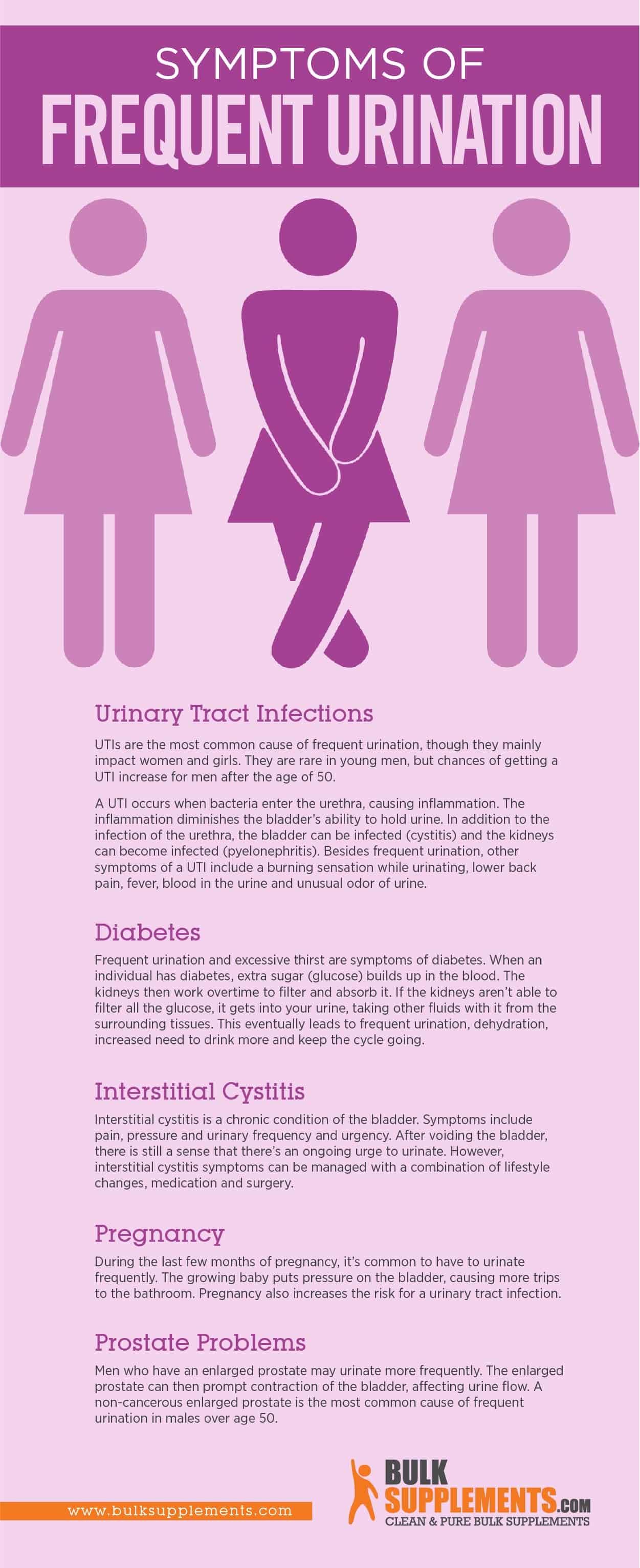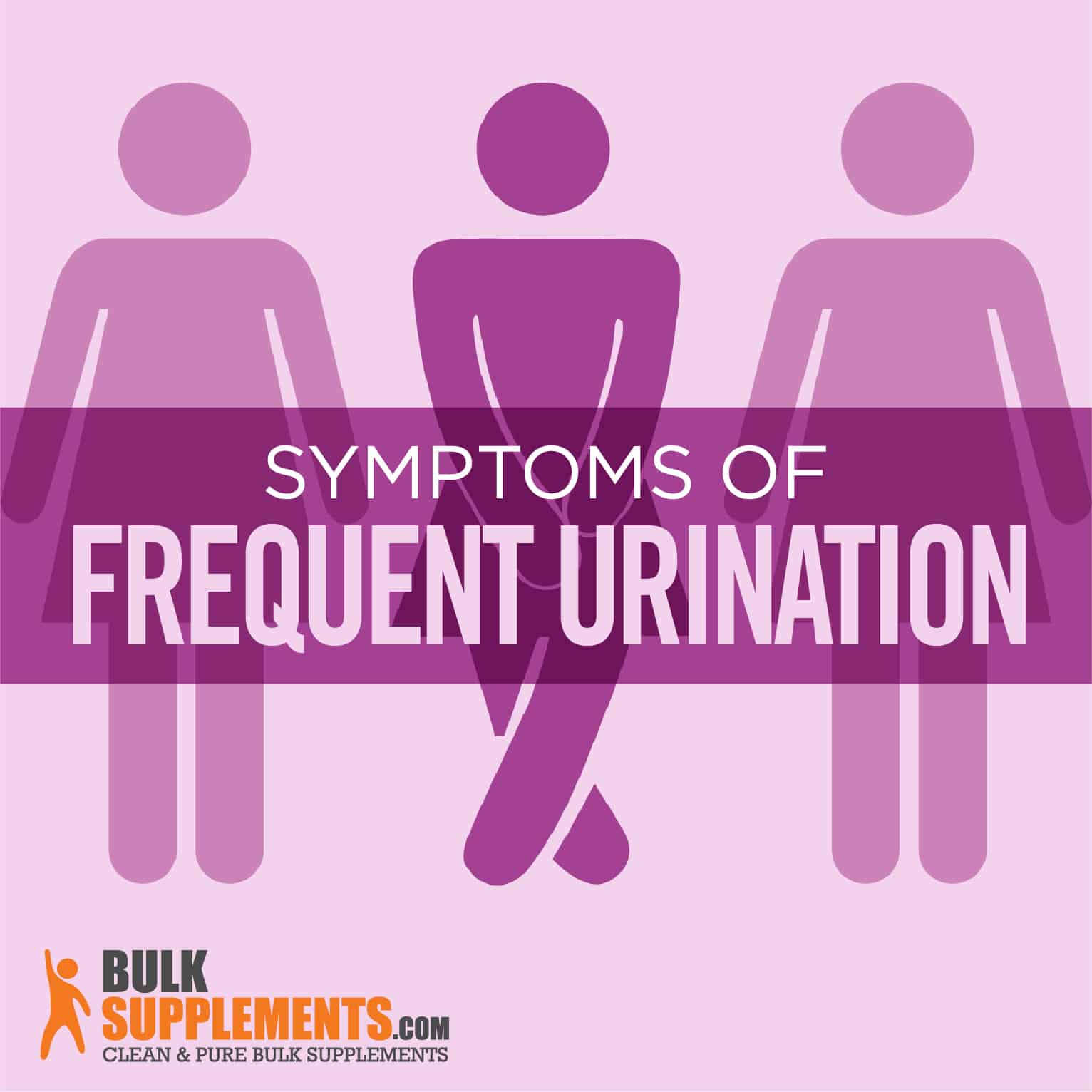What is Frequent Urination?
Frequent urination is defined as the need to empty your bladder more than eight times in a 24-hour period. In most cases, the condition is due to a simple cause and can be easily treated, however, it may be a symptom of an underlying health condition (x).
What Causes Frequent Urination?
There are a number of reasons why people urinate frequently. Drinking caffeinated beverages, sodas, and even alcohol may trigger frequent urination. Consequently, the use of nicotine and artificial sweeteners may trigger the condition because they increase the level of salt and water that is released from your kidneys. Other causes include anxiety, bladder stones and weakened pelvic floor muscles.
Urinary Tract Infections
UTIs are the most common cause of frequent urination, though they mainly impact women and girls. They are rare in young men, but chances of getting a UTI increase for men after the age of 50 and men with enlarged prostate glands.
A UTI occurs when bacteria enter the urethra, causing inflammation. The inflammation diminishes the bladder’s ability to hold urine. Besides frequent urination, other symptoms of a UTI include a burning sensation while urinating, lower back pain, fever, blood in the urine and unusual odor of urine (x).
About 50-60 percent of women will have the unpleasant experience of a UTI sometime in their lives. Some risk factors for a UTI include:
- waiting too long to go to the bathroom
- not drinking enough water
- vaginal irritation and inflammation
- wiping back to front, which exposes the urinary tract to additional bacteria
- sexual intercourse, which can introduce bacteria into the urinary tract
- changes in urinary structure, which can happen during pregnancy
Diabetes
Frequent urination and excessive thirst are symptoms of diabetes. When an individual has diabetes, extra sugar (glucose) builds up in the blood. As a result, kidneys work overtime to filter and absorb it. If the kidneys are unable to filter the glucose, it gets into your urine and takes other fluids from the surrounding tissues, which leads to frequent urination, dehydration, and excessive thirst (x).
Interstitial Cystitis
Interstitial cystitis is a chronic condition of the bladder. Symptoms include pain, pressure and urinary frequency. Even after the bladder has been emptied, there is still a sense that there’s an ongoing urge to urinate. On the positive side, interstitial cystitis can be managed with a combination of lifestyle changes, medication and surgery (x).
Pregnancy
During the last few months of pregnancy, it’s common to have to urinate frequently. The growing baby puts pressure on the bladder, causing more trips to the bathroom. Pregnancy also increases the risk for a urinary tract infection.
Prostate Problems
Men who have an enlarged prostate may urinate more frequently. The enlarged prostate can then prompt contraction of the bladder, affecting urine flow. A non-cancerous enlarged prostate is the most common cause of frequent urination in males over age 50 (x).
Medications
Some sedatives and muscle relaxants such as Valium, Librium, and Ativan can cause frequent urination. Medications that increase the kidney’s production of urine include diuretics such as:
- Lasix
- Demadex
- Fumex
- Maxzide
- Esidrix
- Hydrodiuril
- Oretic
Overactive Bladder (OAB)
Over 33 million Americans have an overactive bladder. (OAB). It is the most common cause of frequent urination. Causes of OAB include injuries, chronic nerve or muscle conditions, estrogen deficiency in menopause and excess body weight. Symptoms of OAB include:
- Sudden urge of urinate (urinary urgency)
- Urine leakage
- Nocturia (getting up to urinate two or more times a night)
- Urinary frequency (urinating eight times or more a day)

Other Urinary Conditions
Frequent urination is not the same as other urinary conditions, though it can often be related. When some people discuss frequent urination, normal urine flow and chronic urinary problems, they may want answers to questions such as:
What is Urinary Incontinence?
Urinary incontinence is the loss of bladder control. This is a common (and embarrassing) problem. This condition can range from bladder leakage to complete and sudden inability to hold urine.
What is Overactive Bladder?
Overactive bladder (OAB) is a common condition, affecting millions of Americans. The primary symptom of an overactive bladder is a sudden, uncontrolled urge to urinate (x). Of less importance, an adult bladder may hold 300-500 milliliters of urine. To illustrate, that is enough to fill between 7 and 11 shot glasses.
What is Polyuria?
Polyuria is the production of abnormally large volumes of diluted urine (more than 3 liters per day).
What is Nocturia?
Nocturia is a condition where you wake during the night because of a need to urinate. Sleep disorders, bladder blockage and a high fluid intake may be causes of Nocturia. Treatment for nocturia includes decreasing fluid intake and some medications (x).
What is Neurogenic Bladder?
Neurogenic bladder can occur when muscles that are holding urine do not receive the message that it’s time to pass urine. The condition causes the bladder to work improperly. Symptoms of a neurogenic bladder may include incontinence, frequent urination, urgency, urge incontinence and retention of urine. There is a risk of serious complications, such as recurrent infections and urine reflux (x).
What is Stress Urinary Incontinence (SUI)?
Stress Urinary Incontinence (SUI) is when urine leaks out in connection with sudden pressure on the bladder area. For instance, sneezing, laughing or coughing can prompt this pressure and trigger incontinence. With more severe SUI, urine leakage may happen with less strenuous actions, such as standing up, walking or bending over. The condition is very common in women. In fact, nearly one third of women experience SUI at some time in their lives (x). Doing kegel exercises may be helpful for people who are having issues with tiny amounts of leakage.
Treatment for Frequent Urination
Check for Underlying Conditions
If frequent urination is disrupting your daily routine, causing you anxiety or you have other severe symptoms, seek the advice of a health practitioner. In fact, it is common for women who have given birth to experience stress incontinence because the muscles that help us urinate weaken after pregnancy and vaginal deliveries.
Make Some Changes
If frequent urination is not caused by additional problems, here are some solutions and remedies for frequent urination:
- Diet change and fluid intake. Caffeine, artificial sweeteners, and alcohol can increase bladder activity. To decrease bladder activity, reduce or eliminate these possible triggers.
- It is important to go to the bathroom after sex, especially if you are female. Bacteria that remains in the vagina may lead to infection.
- Kegel exercises. Tightening your pelvic floor muscles helps you to maintain bowel and bladder functions.
- Bladder retraining. In short, this refers to a program of urinating on schedule, which, over time increases the intervals between urinating.
Seek Medical Help
Undoubtedly, common symptoms of frequent urination include a persistent urge to urinate coupled with a burning sensation each time you do. Seek emergency medical care if frequent urination is accompanied with:
- Fever
- Abdominal pain
- Back or side pain
- Vomiting
- Chills
- Fatigue
- Excessive thirst
- Increased appetite
- Bloody, dark, or cloudy urine
- Discharge from the vagina or penis
Supplements for Bladder Health
Consider using natural supplements to boost the health of your bladder. Here are some supplements that provide support for the urinary tract:Uva Ursi: Before antibiotics were discovered, Uva Ursi, also known as bearberry, was commonly used by Native Americans to treat bladder infections. For the simple reason that antibiotic therapy can result in numerous antibiotic-resistant bacteria issues, this plant-based approach may be effective at supporting urinary tract health.
Corn silk: Excessive use of antibacterial medications can lead to bacterial resistance to certain medications. Corn silk is a common alternative and acts as a soothing diuretic.
Horsetail: This medicinal plant helps the body eliminate excess fluids and salt. In fact, when it comes to soothing urinary tract infections, horsetail is equally as effective as hydrochlorothiazide, a diuretic used to treat edema.
Saw Palmetto: This low-growing palm tree is a good herbal remedy for painful urination and inflammation of the bladder. (saw palmetto extract)
St. John’s Wort: St. John’s Wort extract is a centuries-old herb traditionally used for depression. However, it can relieve pain in people with hypersensitive bladder disorders
Pumpkin Seed Extract powder:As a rich source of Zinc and essential fatty acids, these seeds reduce inflammation and boost urinary tract function. Without doubt, pumpkin extract is an excellent source of manganese, copper, iron and protein.
The Bottom Line
Pregnancy, weakened floor muscles, or prostate problems may trigger frequent urination. However, the condition may be a symptom of a deeper health issue. On the positive side, a number of supplements are available to help treat and relieve overactive bladder.


